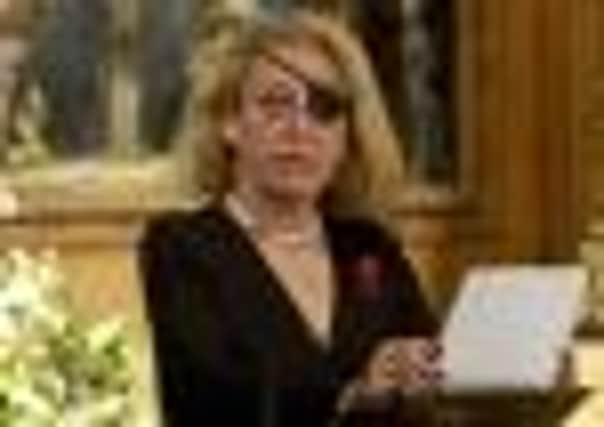Dani Garavelli: Let Marie Colvin’s legacy be an end to Syria bloodshed


‘THEY are killing with impunity.” Those were the words of Marie Colvin as she risked her life to bear witness to the atrocities being inflicted in Homs in Syria by the Bashar al-Assad regime. They have haunted me all week. Yet I would probably never have heard them if Colvin – a woman who had covered dozens of wars in her time as a foreign correspondent for the Sunday Times – had not been murdered by forces who wanted to cover up the truth as fervently as she wanted to expose it.
I hadn’t read her last full report either – a brutal account of lives being lived under constant threat. I hadn’t had the breath knocked out of me by her descriptions of a young mother too traumatised to breastfeed her newborn baby or the way pieces of bread were being thrown over rooftops because indiscriminate snipers had made it too dangerous to go out to fetch food for the hungry.
Advertisement
Hide AdAdvertisement
Hide AdLike everyone else, I’d seen the images of bloodshed on the TV news as I ironed or rustled up the next day’s packed lunches. I’d tut-tutted when I heard China and Russia had vetoed the UN resolution. But I hadn’t fully engaged in the tragedy; hadn’t taken in the enormity of the wrong being perpetrated on innocent civilians.


I’ve read Colvin’s piece now, of course. It stirred in me – as it stirred in so many others – a sense of outrage that such acts could be carried out by a government against its own people, while the international community looked impotently on.
But it also left me with a sense of guilt, which stemmed from the realisation that, though up to 8,000 Syrians have been slaughtered since the start of the uprising a year ago, it has taken the death of two westerners, Colvin and French photographer Remi Ochlik, who was with her, for me to sit up and take notice.
It’s not just me either. Last week it seemed as if, after months of hand-wringing, the internationally community was fully focused on Syria for the first time. Nowhere was the greater value placed on western lives more starkly expressed than by French President Nicolas Sarkozy, who when informed about Ochlik’s death said, without a flicker of insight or embarrassment: “That’s enough now. The regime must go.”
Allied to that, was a niggling irritation over the way Colvin’s death came to dominate the news agenda; despite everything else that was happening, it was her face which accompanied every story. Even though the many tributes were sincere, there was the hint of oneupmanship and the sound of axes grinding, which often accompanies such tragedies; reporters competed to come up with the best Colvin anecdotes for their own newspapers and her death has been exploited to make political points about cutbacks, freedom of information and the Leveson inquiry. I didn’t know Colvin, but since she’d often railed against the kind of journalism that places reporters at the centre of the story, it seemed unlikely she’d have wanted to see her death eclipse those of the civilians she had sacrificed so much to write about.
Perhaps I worry too much. Perhaps I should just accept that Colvin represented the best journalism has to offer and that an outpouring of grief and admiration was the only appropriate response to her passing. It is not unreasonable to suggest that, as one of the few people with the capacity to share the Syrians’ story with the world, her death is of more global significance than any one of the individuals she reported on.
At least now, politicians seem committed to upping the ante against the regime. Unfortunately, a consensus that “something needs to be done” is not the same as a concrete plan. The problem facing the international community is that there is no obvious course of action. Military intervention is unlikely because there has been no request for it by the Arab League, it could cause violence to escalate and the UN will be unable to secure a resolution. And though the west could help the rebels organise and plan for a post-Assad regime, it would be difficult to arm them because they are so fragmented. Even plans for a humanitarian corridor into the besieged cities or safe zones near the border with Turkey have come to nothing because it would require military force to secure them. At the same time, access to food and medical facilities is dwindling and there is a growing fear that should the Free Syrian Army be forced out of Homs then a massacre would follow.
This weekend, however, a glimmer of hope was appearing. The “Friends of Syria” conference which involved 70 countries including the UK passed a declaration calling for the Syrian government to end the violence, allow humanitarian access and permit the delivery of relief supplies. The declaration also pledged to step up sanctions. By Friday night, the International Red Cross had begun moving some women, children and the wounded from Homs.
Advertisement
Hide AdAdvertisement
Hide AdThe statement issued at the end of the conference was apposite. “Participants committed to take steps to apply and enforce restrictions and sanctions on the regime and its supporters as a clear message to the Syrian regime that it cannot attack with impunity,” it said, the last word echoing Colvin’s earlier in the week.
She was a woman who knew what she was doing. She knew the risks of entering Homs illegally on the back of a motocross bike; of climbing over walls in the dark and slipping into muddy trenches to meet rebel fighters, but told friends she thought they were worth it if she could get the world to listen. Well the world’s listening now. What better legacy could Colvin have than an abatement of the violence that was in her words so “anger-making.”